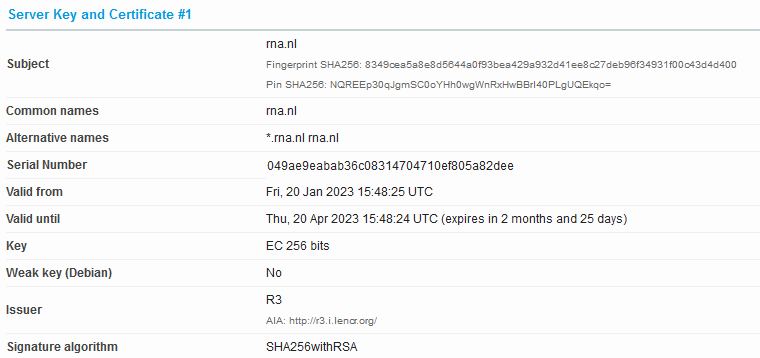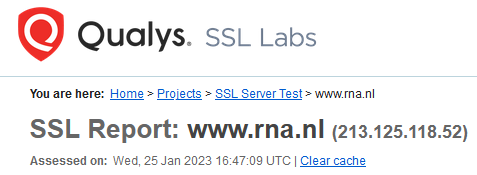The change to allow TLS 1.2 seemed to coincide with the move away from ECC.
I have some SSL Labs scans still open in browser tabs, so here’s Jan 20 vs. 25:
I wonder if that’s what actually fixed this? At least on Linux, mono does ECC fine.
I don’t have mono on macOS, but if anyone is willing to test, that might add data.
One needs to be a little careful because there are several uses as seen in X.509 (Wikipedia)
Signature Algorithm ID
Public Key Algorithm
These sites run the csharp query fine. Here I’ll show algorithms that openssl saw.
OpenSSL: Get all certificates from a website in plain text was the base of the test.
$ (OLDIFS=$IFS; IFS=':' certificates=$(openssl s_client -connect www.cloudflare.com:443 -showcerts -tlsextdebug 2>&1 </dev/null | sed -n '/-----BEGIN/,/-----END/ {/-----BEGIN/ s/^/:/; p}'); for certificate in ${certificates#:}; do echo $certificate | openssl x509 -noout -text; done; IFS=$OLDIFS) | egrep 'Certificate:|Subject:|Algorithm'
Certificate:
Signature Algorithm: ecdsa-with-SHA256
Subject: C = US, ST = California, L = San Francisco, O = "Cloudflare, Inc.", CN = www.cloudflare.com
Public Key Algorithm: id-ecPublicKey
Signature Algorithm: ecdsa-with-SHA256
Certificate:
Signature Algorithm: sha256WithRSAEncryption
Subject: C = US, O = "Cloudflare, Inc.", CN = Cloudflare Inc ECC CA-3
Public Key Algorithm: id-ecPublicKey
Signature Algorithm: sha256WithRSAEncryption
$ (OLDIFS=$IFS; IFS=':' certificates=$(openssl s_client -connect readthedocs.org:443 -showcerts -tlsextdebug 2>&1 </dev/null | sed -n '/-----BEGIN/,/-----END/ {/-----BEGIN/ s/^/:/; p}'); for certificate in ${certificates#:}; do echo $certificate | openssl x509 -noout -text; done; IFS=$OLDIFS) | egrep 'Certificate:|Subject:|Algorithm'
Certificate:
Signature Algorithm: ecdsa-with-SHA384
Subject: CN = *.readthedocs.org
Public Key Algorithm: id-ecPublicKey
Signature Algorithm: ecdsa-with-SHA384
Certificate:
Signature Algorithm: ecdsa-with-SHA384
Subject: C = US, O = Let's Encrypt, CN = E1
Public Key Algorithm: id-ecPublicKey
Signature Algorithm: ecdsa-with-SHA384
Certificate:
Signature Algorithm: sha256WithRSAEncryption
Subject: C = US, O = Internet Security Research Group, CN = ISRG Root X2
Public Key Algorithm: id-ecPublicKey
Signature Algorithm: sha256WithRSAEncryption
Certificate:
Signature Algorithm: sha256WithRSAEncryption
Subject: C = US, O = Internet Security Research Group, CN = ISRG Root X1
Public Key Algorithm: rsaEncryption
Signature Algorithm: sha256WithRSAEncryption
Certbot issues ECDSA key signed with RSA documents how Let’s Encrypt jumps into RSA R3, e.g.
$ (OLDIFS=$IFS; IFS=':' certificates=$(openssl s_client -connect letsencrypt.org:443 -showcerts -tlsextdebug 2>&1 </dev/null | sed -n '/-----BEGIN/,/-----END/ {/-----BEGIN/ s/^/:/; p}'); for certificate in ${certificates#:}; do echo $certificate | openssl x509 -noout -text; done; IFS=$OLDIFS) | egrep 'Certificate:|Subject:|Algorithm'
Certificate:
Signature Algorithm: sha256WithRSAEncryption
Subject: CN = lencr.org
Public Key Algorithm: id-ecPublicKey
Signature Algorithm: sha256WithRSAEncryption
Certificate:
Signature Algorithm: sha256WithRSAEncryption
Subject: C = US, O = Let's Encrypt, CN = R3
Public Key Algorithm: rsaEncryption
Signature Algorithm: sha256WithRSAEncryption
Certificate:
Signature Algorithm: sha256WithRSAEncryption
Subject: C = US, O = Internet Security Research Group, CN = ISRG Root X1
Public Key Algorithm: rsaEncryption
Signature Algorithm: sha256WithRSAEncryption
If the current default certbot certificate doesn’t work in Duplicati, that’s a big deal, so I dug some more.
Fortunately Linux is looking fine. If life is different on macOS, it might even depend on macOS version.
I’m still wondering, though, if site insistence on TLS 1.3 before was what caused the handshake issue.





